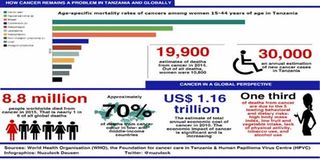How a cancer registry will help control the disease

What you need to know:
- This was revealed during an East Africa Development Bank (EADB) sponsored Medical Training Fellowship (METAF) programme for oncologists from Tanzania and Kenya, conducted by physicians from the London-based Royal College of Physicians (RCP), the Ocean Road Cancer Institute (ORCI) and Kenyatta National Referral Hospital (KNRH) in Kenya.
The Government is in the process of developing a population-based cancer registry, as part of a new health policy to manage the non-communicable disease (NCD).
This was revealed during an East Africa Development Bank (EADB) sponsored Medical Training Fellowship (METAF) programme for oncologists from Tanzania and Kenya, conducted by physicians from the London-based Royal College of Physicians (RCP), the Ocean Road Cancer Institute (ORCI) and Kenyatta National Referral Hospital (KNRH) in Kenya.
Reasoning
Speaking during the seminar, Dr Nazima Darsee, head of academic unit at the ORCI said, “The register is important because it will let us know the burden of the disease in Tanzania, how huge the problem is, and its distribution.”
Adding to that, Dr Darsee said that currently, the country is forced to rely on hospital based cancer registries and other centres that treat cancer across Tanzania.
According to Dr Darsee, the registry will also enable the government map out areas where the disease is most prevalent in order to allocate resources accordingly.
She said the problem was further compounded by the fact that Tanzania has a deficiency of pathologists who are currently in consultancies, zonal and referral hospital including Muhimbili National Hospital (MNH) and ORCI and a few private hospitals.
On his part, Dr Khamza Maunda a clinical oncologist from ORCI estimated that Tanzania registers almost 30,000 new cancer patients every year, while ORCI which is the largest cancer referral institution in the country is only able to attend to 5,000 that’s equivalent to 10 per cent of the patients.
Target
Managed by the British Council (BC) and the Royal College of Physicians, the program in its second year intends to train 600 East African physicians over a period of four years. It targets four EADB member states of Kenya, Uganda, Tanzania and Rwanda and aims to increase the early detection, research and treatment of cancer and neurological disorders, especially in communities and areas where access to qualified professionals remains a challenge by increasing the number, quality and deployment of medical professionals in public service specialising in the treatment of cancer and neurological disorders in the East Africa region. The program also aims at demystifying myths about cancer treatment.
Burden
Speaking on the closing day of the seminar, tha national director dealing with non-communicable diseases, confessed that the prevalence of non-communicable diseases has been on the rise in the Tanzania for the past two decades and data suggests a gloomy trend going forward unless strong national responses are implemented.
He went on saying, many people in Tanzania are at higher risk of getting non-communicable-diseases and most particularly, various types of cancer, this is all due to lack of knowledge among the societies on how to manage the risk factors for the non-communicable diseases.
For instance, recent data, released by the World Health Organisation(WHO), suggests that, non-communicable diseases are by far the leading cause of death in the world, representing 63 per cent of all annual deaths. Non-communicable diseases kill more than 36 million people each year. Some 80 per cent of all NCD occur in a low-and middle-income countries where Tanzania appears to be the case when it comes to cancer.
This programme will therefore, help the government to strengthen the capacity of health care system in the whole process of cancer registry in the country in order to prevent, detect,and manage cancer and other non-communicable diseases, complications and related conditions and through this, contribute to the strengthen of the national non-communicable diseases response in Tanzania.
Gaps
For Tanzania, to get rid of non-communicable diseases, it needs to set right priorities he insisted. The story of non-communicable diseases control should not just be left to the ministry of health itself.
It is no doubt that Tanzania carries a big burden of cancer diseases and some reliable data suggests that there has been a consistent, and signficant rise in the number of cases since 2013.
For instance, cervical cancer ranks as the leading type in Tanzania with 1896 cases recorded last year alone. And East Africa suffers by far the highest mortality rate in the world at 27 cervical cancer deaths for every 100,000 women. This is nine times the rate in the United States. Other notorious types of cancer in Tanzania are ‘kaporsi sarcoma’ and ‘breast cancer’.
Although, actual fugures are yet to be collected, it’s clear that even though cancer is more likely to be high in urban areas due to unhealthy lifestyle and urbanisation, we still need to understand that people in those regions, are more likely to easily seek medical care, are more aware of cancer and can easily report their problems early compare to those in rural settings.
This clearly shows that, until today, Tanzania has not carried out a population-based study that could give a true picture of the national cancer burden.
Our major cancer hospitals like Muhimbili national hospital and the Ocean Road Cancer Institute need a high-tech cancer registry that could help give correct data on cancer.
Cancer experts also fear that, cancer burden could be bigger than it is currently estimated because most cancer cases in rural areas go undiagnosed due to lack of diagnostic tools in most upcountry hospitals and the shortage of cancer specialists.
In October last year, 10 doctors from Tanzania underwent a similar training in Nairobi.
“What we are calling the trainers of trainees will be distributed in 4 zones, with each zone having at least 2 trainers,” said Dr Maunda.
The training comes at a time when the number of cancer cases worldwide is expected to surge by 75 per cent during the next two decades according to WHO Cancer Research.
Deaths from cancers have been on the increase in the East African region with the main cause being associated with lack of treatment facilities and expertise for treatment, prevention and early detection.




